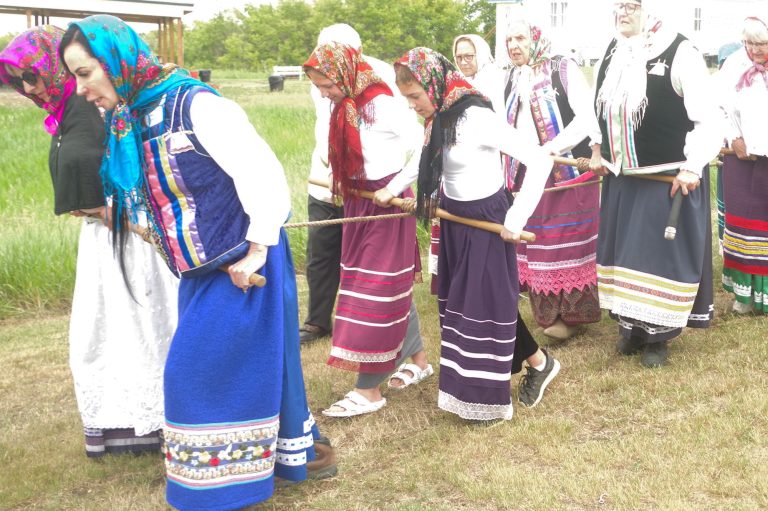
In Canadian “history”, there are so many facts which aren’t a part of our “official” history books. However, when different disenfranchised communities begin to compare their verbal histories, more often than not, common threads can be found when they begin to compare the passed down knowledge.
Such is the case between the Doukhobor community near Muskeg Lake Cree Nation. The acknowledgement of this common history is re-enacted in an outdoor performance at the Doukhobor Caverns Historical Site, roughly 90 minutes away from Prince Albert, just south of Blaine Lake. Members of both communities participate in the powerful ceremony.
“It’s very important,” said Cal Arcand, a council member of the Muskeg Lake Cree Nation.
“We had the Doukhobors out for our celebration last weekend in the Muskeg Lake Community. It was our Veterans’ Powwow. We saw it fitting, as they engaged with us.”
The relationship between the two communities begins a long time ago. It started with a male community member from Muskeg Lake seeing a team of 10 Doukhobor women pulling a plow to break the soil for their community. Feeling sorry for the newcomers, and risking jail time by sneaking off of his home reserve, he gave the Doukhobor community a horse they could use for pulling the plow to farm their land.
“The story also brings up the darker history,” Arcand said. “This is our traditional lands, our treaty rights gone to trap, fish, and gather…to sneak off the reserve to come and help more settlers, it tells a nice story.”
Deborah Lee, a member of the Doukhobor community who participated in the re-enactment, agreed completely.
“I feel so honoured and blessed to be here,” Lee said. “I’m just learning about my Doukhobor heritage, and Native Spirituality has always resonated deeply with me. To find we have such a connection is an honour to me, and I’m just happy to be here.”
Lieutenant Governor Russ Mirasty was among the members of the audience. Mirasty first visited the site in 2021 for the summer opening ceremony.
“Last year, (learning of this history) was new to me, in terms of the Doukhobor settlers here, and this background, and coming together with the First Nations people in a very positive way,” he explained.
Hidden histories are coming to light now, in a time of reconciliation with people of all backgrounds. The Doukhobors were persecuted in Russia and immigrated to Canadian soil to find a new life. Learning about these histories is huge, Doukhobor Dugout House Historic Site founder Brenda Cheveldayoff explained.
“It is a story that’s been hidden away in archives,” she said. “I’m so glad to bring it alive today and work with the Indigenous community to make this happen.”
What about other hidden histories in Canada?
“We need to learn more about these types of situations,” said Mirasty.
“I’m sure there’s others that existed around (Canada)in terms of that co-operation between Indigenous people and settlers. It’s a heartwarming story, and to re-live it, and to actually witness how the women dragged the plow, it’s incredible.”
The thirst for learning more of this hidden history was inspiring for the participants. When asked about the idea of discovering these histories, Lee said that one must “take the time and be open-minded, and learn about the good and the bad of our country (of Canada) and learn about what happened to our people, and the people of the land, the people who were here first.
“Like the song said, ‘Let’s live and love together, and in harmony as we’re supposed to, as the Creator would want us to be’.”
Mirasty added, “When we talk about history of the country (of Canada), I think we need to dig a little deeper and find more of these situations that we can talk about and share and learn.”
